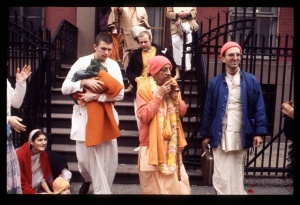SB 7.13.1: Difference between revisions
m (1 revision(s)) |
(Vanibot #0018 edit: make synonym terms in Sanskrit italic in SB - Vanisource) |
||
| Line 1: | Line 1: | ||
{{info | {{info | ||
|speaker= | |speaker=Nārada Muni | ||
|listener=King | |listener=King Yudhiṣṭhira | ||
}} | }} | ||
[[Category:Srimad-Bhagavatam - Canto 07 Chapter 13|s01 ]] | |||
[[Category:Bhagavatam Verses Spoken by Narada Muni - Vanisource|071301]] | |||
<div style="float:left">'''[[Srimad-Bhagavatam]] - [[SB 7|Seventh Canto]] - [[SB 7.13: The Behavior of a Perfect Person|Chapter 13: The Behavior of a Perfect Person]]'''</div> | |||
<div style="float:right">[[File:Go-previous.png|link=SB 7.13 Summary]] '''[[SB 7.13 Summary]] - [[SB 7.13.2]]''' [[File:Go-next.png|link=SB 7.13.2]]</div> | |||
{{RandomImage}} | |||
==== TEXT 1 ==== | ==== TEXT 1 ==== | ||
<div | <div class="verse"> | ||
śrī-nārada uvāca | :śrī-nārada uvāca | ||
kalpas tv evaṁ parivrajya | :kalpas tv evaṁ parivrajya | ||
deha-mātrāvaśeṣitaḥ | :deha-mātrāvaśeṣitaḥ | ||
grāmaika-rātra-vidhinā | :grāmaika-rātra-vidhinā | ||
nirapekṣaś caren mahīm | :nirapekṣaś caren mahīm | ||
</div> | </div> | ||
| Line 18: | Line 23: | ||
==== SYNONYMS ==== | ==== SYNONYMS ==== | ||
<div | <div class="synonyms"> | ||
śrī-nāradaḥ | ''śrī-nāradaḥ uvāca''—Śrī Nārada Muni said; ''kalpaḥ''—a person who is competent to undergo the austerities of sannyāsa, the renounced order of life, or to prosecute studies in transcendental knowledge; ''tu''—but; ''evam''—in this way (as described previously); ''parivrajya''—fully understanding his spiritual identity and thus traveling from one place to another; ''deha-mātra''—keeping only the body; ''avaśeṣitaḥ''—at last; ''grāma''—in a village; ''eka''—one only; ''rātra''—of passing a night; ''vidhinā''—in the process; ''nirapekṣaḥ''—without dependence on any material thing; ''caret''—should move from one place to another; ''mahīm''—on the earth. | ||
</div> | </div> | ||
| Line 25: | Line 30: | ||
==== TRANSLATION ==== | ==== TRANSLATION ==== | ||
<div | <div class="translation"> | ||
Śrī Nārada Muni said: A person able to cultivate spiritual knowledge should renounce all material connections, and merely keeping the body inhabitable, he should travel from one place to another, passing only one night in each village. In this way, without dependence in regard to the needs of the body, the sannyāsī should travel all over the world. | Śrī Nārada Muni said: A person able to cultivate spiritual knowledge should renounce all material connections, and merely keeping the body inhabitable, he should travel from one place to another, passing only one night in each village. In this way, without dependence in regard to the needs of the body, the sannyāsī should travel all over the world. | ||
</div> | </div> | ||
__NOTOC__ | |||
<div style="float:right; clear:both;">[[File:Go-previous.png|link=SB 7.13 Summary]] '''[[SB 7.13 Summary]] - [[SB 7.13.2]]''' [[File:Go-next.png|link=SB 7.13.2]]</div> | |||
__NOTOC__ | |||
__NOEDITSECTION__ | |||
Revision as of 05:43, 1 December 2017

A.C. Bhaktivedanta Swami Prabhupada
TEXT 1
- śrī-nārada uvāca
- kalpas tv evaṁ parivrajya
- deha-mātrāvaśeṣitaḥ
- grāmaika-rātra-vidhinā
- nirapekṣaś caren mahīm
SYNONYMS
śrī-nāradaḥ uvāca—Śrī Nārada Muni said; kalpaḥ—a person who is competent to undergo the austerities of sannyāsa, the renounced order of life, or to prosecute studies in transcendental knowledge; tu—but; evam—in this way (as described previously); parivrajya—fully understanding his spiritual identity and thus traveling from one place to another; deha-mātra—keeping only the body; avaśeṣitaḥ—at last; grāma—in a village; eka—one only; rātra—of passing a night; vidhinā—in the process; nirapekṣaḥ—without dependence on any material thing; caret—should move from one place to another; mahīm—on the earth.
TRANSLATION
Śrī Nārada Muni said: A person able to cultivate spiritual knowledge should renounce all material connections, and merely keeping the body inhabitable, he should travel from one place to another, passing only one night in each village. In this way, without dependence in regard to the needs of the body, the sannyāsī should travel all over the world.